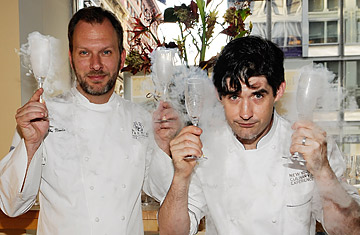
Nils Noren, left, and Dave Arnold
Any modern chef worth his methylcellulose has an idol, a more advanced soul that he looks to for guidance: Wylie Dufresne of wd~50, say, or Johnny Iuzzini of Jean-Georges. But who do these seers look to? It's a poorly kept secret of the food world that even the gurus have gurus, and the leading lights of far-out food are not even chefs: they are two guys who work at a cooking school and write what might be the best food blog ever.
Cooking Issues is the French Culinary Institute (FCI) tech blog, but the name does justice neither to how fun it is nor to how wide-ranging and influential it is among chefs. Read it if you want to get a glimpse of what is going to happen on your plate in six months (or six years, depending on where you live). The authors, Dave Arnold and Nils Noren, are, respectively, the director of culinary technology and vice president of culinary and pastry art at New York City's leading cooking school. But really, they are mad scientists, overstimulated, insatiable, with the kind of superhuman intellect that used to be indicated in science-fiction movies by giant bald, radish-shaped cerebellums. Usually, the posts on Cooking Issues look at a particular problem that nobody ever gave a crap about, such as the best way to cook a yak steak or how differently shaped ice cubes affect a drink. Basically, this blog is what every young chef in the country is reading to come up with the next big thing. (And if they're not reading it, they should be.)
A typical post starts like this: "It has been a year since quick agar clarification changed my life." How can you not keep reading? The post continues: "I was looking for a way to clarify lime juice without the help of a $15,000 rotary evaporator or a $20,000 centrifuge. Even if you have the equipment, these techniques produce only small quantities." There, in a nutshell, is the Cooking Issues mind at work. It's all coming out in a rush; it assumes you know and care as much as it does about agar clarification, when in fact there are probably only nine people in America who have even heard of such a thing. Then it gets your objections out of the way — wouldn't you just use a rotary evaporator (a what?) or a centrifuge? (Wait, a what?) Then it gets down to business.
The co-authors came to this weird blog through very different paths. Noren is an accomplished chef who ran the kitchen at the three-star Aquavit for 10 years before joining the FCI. Arnold was neither a chef nor even really a scientist, but rather a tech geek whose major qualification was being the smartest, craziest person anyone in the food world knew. The late Michael Batterberry, a hugely esteemed figure in New York food circles, recommended him to the FCI, which gave him the keys to the food-science lab of his dreams.
The FCI can't get enough credit for keeping these guys on the payroll. Essentially, it is subsidizing pure research. I know that Arnold and Noren have actual jobs that don't involve experimenting with secret Japanese fish-killing techniques or determining to what extent different shaking techniques impact cocktail flavor. It's just that I don't care about their day jobs. The passion and brilliance with which these two men attack such seemingly random subjects inspire me. And if even as inert a being as myself, wrapped up in the love of hamburgers and the worship of Colonel Sanders, can be thus inspired, imagine what they are doing for a whole generation of inquisitive, open-minded young chefs.
Not that the blog presents any program for fans to follow. Cooking Issues is marked by a stop-and-start mercuriality: the co-authors find a subject that appeals to them, unleash a fusillade of experimentation and eventually release their findings, at whatever length they feel appropriate. ("If something interests us," Arnold says, "we really do just run it into the ground.") Some projects, like their epic cocktail-science experiment, go on for a while; other projects, like the Cooking Issues Marketplace, fizzle and die. (At the moment, the latter contains two categories, enzymes and glassware, neither with a single post.) It doesn't matter; the most interesting thing on the blog is not so much the science or the results of the research but seeing what Dave and Nils are chewing on.
Sometimes their experiments work, sometimes they don't. When they told me that they had found a way to scientifically produce a hamburger in a bag, I decided to arrange a taste test. It wasn't actually that good, but it was interesting enough to make a video about. While I was there, they asked me if I wanted to see how they made a pecan bourbon sour, and that was interesting too.
The point is that you never know what you're going to find on Cooking Issues. It might be an interminable disquisition on the taste and composition of biblical manna, or it might be pictures of celebrities like Merle Haggard drinking Scandinavian liquor, a big tradition on the blog. You really just don't know. Which is why everyone reads the blog. Whatever is coming next, chances are there will have been some mention of it on the blog, some hint in this secret portal to the minds of two madmen, who are wired into the future of food.
Ozersky is a James Beard Award–winning food writer and the author of The Hamburger: A History. His food video site, Ozersky.TV, is updated daily. He is currently at work on a biography of Colonel Sanders. Taste of America, Ozersky's food column for TIME.com, appears every Wednesday.
